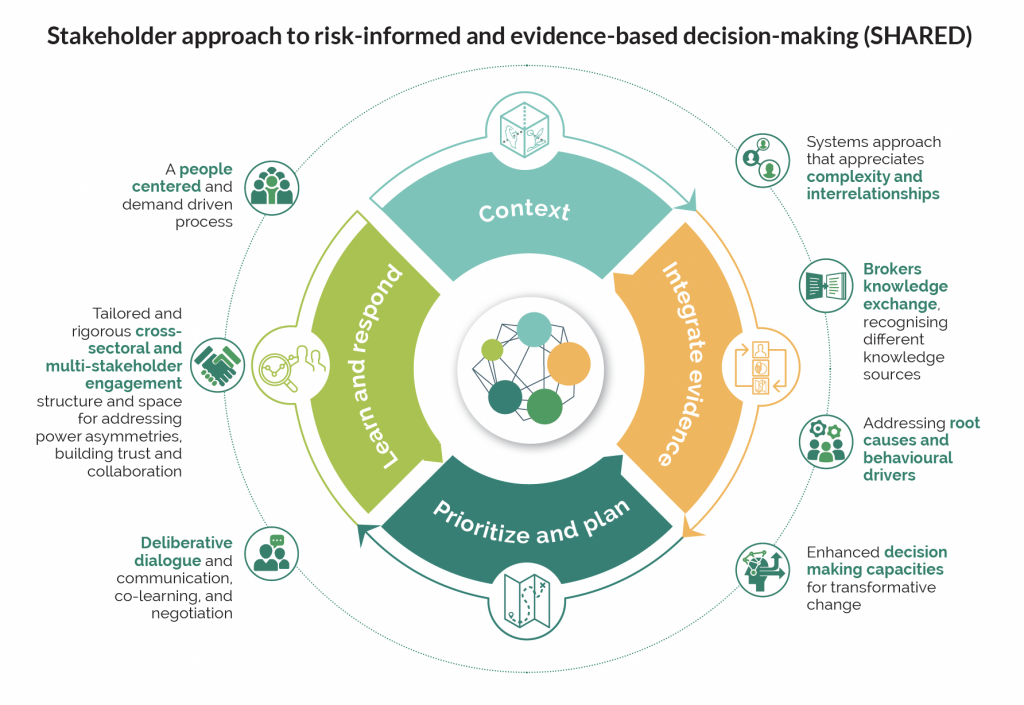We see it time and again in Integrated Landscape Management: you’re wanting to tackle complex decisions but don’t have the tools or the training to support you. You’re wanting to shift towards more inclusive, inter-sectoral and inter-institutional integration in decision-making, but where to even begin?
You are invited to listen in on the workshop on the fundamentals of stakeholder facilitation and engagement we held in early September, in which many of our projects were represented and important questions asked and discussed.
Based on the SHARED Decision Hub framework, we looked at:
- why a structured process for stakeholder engagement is instrumental to achieving desired landscape outcomes
- the principles of the SHARED process
- fundamentals of facilitating stakeholder engagement
- what is involved in developing an engagement strategy
- case studies from the Landscapes For Our Future programme.
Agenda
| Time (EAT) | Activity | Session lead | Session description |
|---|---|---|---|
| 15.00 | Opening remarks Introductions Gathering perspectives Principles of engagement Learning objectives | Khalil Walji, Sabrina Trautman (Trainer) & Constance Neely (Trainer) | Engagement across LFF country teams Co-learning on current reflections on engagement |
| 15.15 | Overview of stakeholder engagement skills building approach learning objectives and process | Trainers | Introduce the SHARED engagement plan framework and how it can be applied to the context integrate landscape management |
| 15.25 | Role and importance of stakeholder engagement | Trainers | Key principles and activities of stakeholder engagement |
| 15.40 | Addressing facilitated engagement challenges | Trainers | Processes for addressing stakeholder engagement challenges |
| 15.55 | Q&A on general engagement | Kim Geheb | Learning exchange session |
| 16.05 | Introducing project teams Co-learning across LFF project experiences | LFF Country Project teams Senegal Vietnam Cambodia | Presentations by three groups (and hopefully others volunteer to share experiences) |
| 16.35 | Matching of specific tools and Reflections and matching of specific tools and processes to project priorities | Trainers and all | Group feedback and discussion |
| 16.50 | Q&A, Next Steps and Close | Trainers, Khalil Walji and Kim Geheb | Co-agreement on next steps on engagement |
More about the SHARED approach
This approach includes four interrelated phases using comprehensive facilitation to support interaction with evidence, enhance co-learning, build long-term relationships and ensure that evidence can be critically interpreted, queried, and evaluated. This approach ensures cohesive communication across multiple institutions, political levels and knowledge systems to build capacity and the evidence base as a continuously linked process, within the same development outcome pathway.
Key factors, steps and principles in the SHARED framework include:
- a people-centred and demand-driven process;
- tailored and rigorous cross-sectoral and multi-stakeholder engagement structure and space for addressing power asymmetries, building trust and collaboration;
- deliberative dialogue and communication, co-learning, and negotiation;
- brokered knowledge exchange, recognising different knowledge sources;
- a systems approach that appreciates complexity and inter-relationship;
- addressing root causes and behavioural drivers;
- and enhanced decision-making capacities for transformative change.




